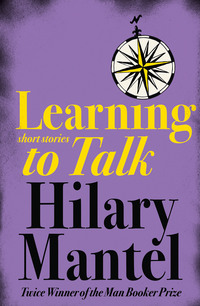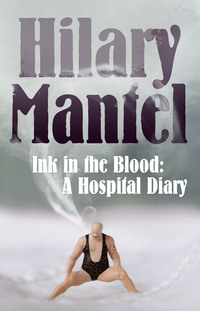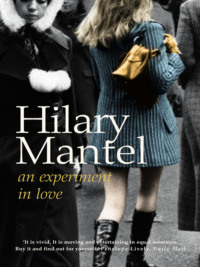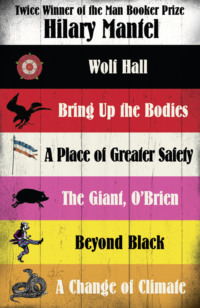
Полная версия
The Wolf Hall Trilogy
While you were in France, he says, my wife Elizabeth died.
The cardinal looks up. His hands fly to his heart. His right hand creeps down to the crucifix he wears. He asks how it occurred. He listens. His thumb runs over the tortured body of God: over and over, as if it were any lump of metal. He bows his head. He murmurs, ‘Whom the Lord loveth …’ They sit in silence. To break the silence, he begins to ask the cardinal unnecessary questions.
He scarcely needs an account of the tactics of the summer just past. The cardinal has promised to help finance a French army which will go into Italy and try to expel the Emperor. While this is happening, the Pope, who has lost not just the Vatican but the papal states, and seen Florence throw out his Medici relatives, will be grateful and obliged to King Henry. But as for any longterm rapprochement with the French – he, Cromwell, shares the scepticism of his friends in the city. If you have been in the street in Paris or Rouen, and seen a mother pull her child by the hand, and say, ‘Stop that squalling, or I'll fetch an Englishman,’ you are inclined to believe that any accord between the countries is formal and transient. The English will never be forgiven for the talent for destruction they have always displayed when they get off their own island. English armies laid waste to the land they moved through. As if systematically, they performed every action proscribed by the codes of chivalry, and broke every one of the laws of war. The battles were nothing; it was what they did between the battles that left its mark. They robbed and raped for forty miles around the line of their march. They burned the crops in the fields, and the houses with the people inside them. They took bribes in coin and in kind and when they were encamped in a district they made the people pay for every day on which they were left unmolested. They killed priests and hung them up naked in the marketplaces. As if they were infidels, they ransacked the churches, packed the chalices in their baggage, fuelled their cooking fires with precious books; they scattered relics and stripped altars. They found out the families of the dead and demanded that the living ransom them; if the living could not pay, they torched the corpses before their eyes, without ceremony, without a single prayer, disposing of the dead as one might the carcases of diseased cattle.
This being so, the kings may forgive each other; the people scarcely can. He does not say this to Wolsey, who has enough bad news waiting for him. During his absence, the king had sent his own envoy to Rome for secret negotiations. The cardinal had found it out; and it had come to nothing, of course. ‘But if the king is less than frank with me, it does nothing to aid our cause.’
He has never before met with such double-dealing. The fact is, the king knows his case is weak in law. He knows this, but does not want to know it. In his own mind, he has convinced himself he was never married and so is now free to marry. Let us say, his will is convinced, but not his conscience. He knows canon law, and where he does not know it already he has made himself expert. Henry, as the younger brother, was brought up and trained for the church, and for the highest offices within it. ‘If His Majesty's brother Arthur had lived,’ Wolsey says, ‘then His Majesty would have been the cardinal, and not me. Now there's a thought. Do you know, Thomas, I haven't had a day off since … since I was on the boat, I suppose. Since the day I was seasick, starting at Dover.’
They had once crossed the Narrow Sea together. The cardinal had lain below, calling on God, but he, being used to the voyage, spent the time on deck, making drawings of the sails and rigging, and of notional ships with notional rigging, and trying to persuade the captain – ‘yourself not offended,’ he said – that there was a way of going faster. The captain thought it over and said, ‘When you fit out a merchant ship of your own, you can do it that way. Of course, any Christian vessel will think you're pirates, so don't look for help if you get in difficulties. Sailors,’ he explained, ‘don't like anything new.’
‘Nor does anyone else,’ he'd said. ‘Not as far as I can see.’
There cannot be new things in England. There can be old things freshly presented, or new things that pretend to be old. To be trusted, new men must forge themselves an ancient pedigree, like Walter's, or enter into the service of ancient families. Don't try to go it alone, or they'll think you're pirates.
This summer, with the cardinal back on dry land, he remembers that voyage. He waits for the enemy to come alongside, and for the hand-to-hand fighting to begin.
But for now he goes down to the kitchens, to see how they are getting on with their masterpieces to impress the French envoys. They have got the steeple on their sugar-paste model of St Paul's, but they are having trouble with the cross and ball on top. He says, ‘Make marzipan lions – the cardinal wants them.’
They roll their eyes and say, will it never end?
Since he returned from France their master has been uncharacteristically sour. It is not just the overt failures that make him grumble, but the dirty work behind the scenes. Squibs and slanders were printed against him and as fast as he could buy them up there was a new batch on the street. Every thief in France seemed to converge on his baggage train; at Compiègne, though he mounted a day-and-night guard on his gold plate, a little boy was found to be going up and down the back stairs, passing out the dishes to some great robber who had trained him up.
‘What happened? Did you catch him?’
‘The great robber was put in the pillory. The boy ran away. Then one night, some villain sneaked into my chamber, and carved a device by the window …’ And next morning, a shaft of early sun, creeping through mist and rain, had picked out a gallows, from which dangled a cardinal's hat.
Once again the summer has been wet. He could swear it has never been light. The harvest will be ruined. The king and the cardinal exchange recipes for pills. The king lays down cares of state should he happen to sneeze, and prescribes for himself an easy day of music-making or strolling – if the rain abates – in his gardens. In the afternoon, he and Anne sometimes retire and are private. The gossip is that she allows him to undress her. In the evenings, good wine keeps the chills out, and Anne, who reads the Bible, points out strong scriptural commendations to him.
After supper he grows thoughtful, says he supposes the King of France is laughing at him; he supposes the Emperor is laughing too. After dark the king is sick with love. He is melancholy, sometimes unreachable. He drinks and sleeps heavily, sleeps alone; he wakes, and because he is a strong man and a young man still he is optimistic, clear-headed, ready for the new day. In daylight, his cause is hopeful.
The cardinal doesn't stop work if he's ill. He just goes on at his desk, sneezing, aching, and complaining.
In retrospect, it is easy to see where the cardinal's decline began, but at the time it was not easy. Look back, and you remember being at sea. The horizon dipped giddily, and the shoreline was lost in mist.
October comes, and his sisters and Mercy and Johane take his dead wife's clothes and cut them up carefully into new patterns. Nothing is wasted. Every good bit of cloth is made into something else.
At Christmas the court sings:
As the holly groweth green
And never changes hue
So I am, and ever hath been,
Unto my lady true.
Green groweth the holly, so doth the ivy.
Though winter blasts blow ever so high.
As the holly groweth green,
With ivy all alone,
When flowers cannot be seen
And green-wood leaves be gone,
Green groweth the holly.
Spring, 1528: Thomas More, ambling along, genial, shabby. ‘Just the man,’ he says. ‘Thomas, Thomas Cromwell. Just the man I want to see.’
He is genial, always genial; his shirt collar is grubby. ‘Are you bound for Frankfurt this year, Master Cromwell? No? I thought the cardinal might send you to the fair, to get among the heretic booksellers. He is spending a deal of money buying up their writings, but the tide of filth never abates.’
More, in his pamphlets against Luther, calls the German shit. He says that his mouth is like the world's anus. You would not think that such words would proceed from Thomas More, but they do. No one has rendered the Latin tongue more obscene.
‘Not really my business,’ Cromwell says, ‘heretics' books. Heretics abroad are dealt with abroad. The church being universal.’
‘Oh, but once these Bible men get over to Antwerp, you know … What a town it is! No bishop, no university, no proper seat of learning, no proper authorities to stop the proliferation of so-called translations, translations of scripture which in my opinion are malicious and wilfully misleading … But you know that, of course, you spent some years there. And now Tyndale's been sighted in Hamburg, they say. You'd know him, wouldn't you, if you saw him?’
‘So would the Bishop of London. You yourself, perhaps.’
‘True. True.’ More considers it. He chews his lip. ‘And you'll say to me, well, it's not work for a lawyer, running after false translations. But I hope to get the means to proceed against the brothers for sedition, do you see?’ The brothers, he says; his little joke; he drips with disdain. ‘If there is a crime against the state, our treaties come into play, and I can have them extradited. To answer for themselves in a straiter jurisdiction.’
‘Have you found sedition in Tyndale's writing?’
‘Ah, Master Cromwell!’ More rubs his hands together. ‘I relish you, I do indeed. Now I feel as a nutmeg must do when it's grated. A lesser man – a lesser lawyer – would say, “I have read Tyndale's work, and I find no fault there.” But Cromwell won't be tripped – he casts it back, he asks me, rather, have you read Tyndale? And I admit it. I have studied the man. I have picked apart his so-called translations, and I have done it letter by letter. I read him, of course, I do. By licence. From my bishop.’
‘It says in Ecclesiasticus, “he that toucheth pitch shall be defiled.” Unless his name's Thomas More.’
‘Well now, I knew you were a Bible reader! Most apt. But if a priest hears a confession, and the matter be wanton, does that make the priest a wanton fellow himself?’ By way of diversion, More takes his hat off, and absently folds it up in his hands; he creases it in two; his bright, tired eyes glance around, as if he might be confuted from all sides. ‘And I believe the Cardinal of York has himself licensed his young divines at Cardinal College to read the sectaries' pamphlets. Perhaps he includes you in his dispensations. Does he?’
It would be strange for him to include his lawyer; but then it's strange work for lawyers altogether. ‘We have come around in a circle,’ he says.
More beams at him. ‘Well, after all, it's spring. We shall soon be dancing around the maypole. Good weather for a sea voyage. You could take the chance to do some wool-trade business, unless it's just men you're fleecing these days? And if the cardinal asked you to go to Frankfurt, I suppose you'd go? Now if he wants some little monastery knocked down, when he thinks it has good endowments, when he thinks the monks are old, Lord bless them, and a little wandering in their wits; when he thinks the barns are full and the ponds well stocked with fish, the cattle fat and the abbot old and lean … off you go, Thomas Cromwell. North, south, east or west. You and your little apprentices.’
If another man were saying this, he'd be trying to start a fight. When Thomas More says it, it leads to an invitation to dinner. ‘Come out to Chelsea,’ he says. ‘The talk is excellent, and we shall like you to add to it. Our food is simple, but good.’
Tyndale says a boy washing dishes in the kitchen is as pleasing to the eye of God as a preacher in the pulpit or the apostle on the Galilee shore. Perhaps, he thinks, I won't mention Tyndale's opinion.
More pats his arm. ‘Have you no plans to marry again, Thomas? No? Perhaps wise. My father always says, choosing a wife is like putting your hand into a bag full of writhing creatures, with one eel to six snakes. What are the chances you will pull out the eel?’
‘Your father has married, what, three times?’
‘Four.’ He smiles. The smile is real. It crinkles the corner of his eyes. ‘Your beadsman, Thomas,’ he says, as he ambles away.
When More's first wife died, her successor was in the house before the corpse was cold. More would have been a priest, but human flesh called to him with its inconvenient demands. He did not want to be a bad priest, so he became a husband. He had fallen in love with a girl of sixteen, but her sister, at seventeen, was not yet married; he took the elder, so that her pride should not be hurt. He did not love her; she could not read or write; he hoped that might be amended, but seemingly not. He tried to get her to learn sermons by heart, but she grumbled and was stubborn in her ignorance; he took her home to her father, who suggested beating her, which made her so frightened that she swore she would complain no more. ‘And she never did,’ More will say. ‘Though she didn't learn any sermons either.’ It seems he thought the negotiations had been satisfactory: honour preserved all round. The stubborn woman gave him children, and when she died at twenty-four, he married a city widow, getting on in years and advanced in stubbornness: another one who couldn't read. There it is: if you are so lenient with yourself as to insist on living with a woman, then for the sake of your soul you should make it a woman you really don't like.
Cardinal Campeggio, whom the Pope is sending to England at Wolsey's request, was a married man before he was a priest. It makes him especially suitable to help Wolsey – who of course has no experience of marital problems – on the next stage of the journey to thwart the king in his heart's desire. Though the imperial army has withdrawn from Rome, a spring of negotiations has failed to yield any definite result. Stephen Gardiner has been in Rome, with a letter from the cardinal, praising the Lady Anne, trying to disabuse the Pope of any notion he may entertain that the king is being wilful and whimsical in his choice of bride. The cardinal had sat long over the letter listing her virtues, writing it in his own hand. ‘Womanly modesty … chastity … can I say chastity?’
‘You'd better.’
The cardinal looked up. ‘Know something?’ He hesitated, and returned to his letter. ‘Apt to bear children? Well, her family is fertile. Loving and faithful daughter of the church … Perhaps stretching a point … they say she has the scriptures in French set up in her chamber, and lets her women read them, but I would have no positive knowledge of that …’
‘King François allows the Bible in French. She learned her scriptures there, I suppose.’
‘Ah, but women, you see. Women reading the Bible, there's another point of contention. Does she know what Brother Martin thinks is a woman's place? We shouldn't mourn, he says, if our wife or daughter dies in childbirth – she's only doing what God made her for. Very harsh, Brother Martin, very intractable. And perhaps she is not a Bible-woman. Perhaps it is a slur on her. Perhaps it is just that she is out of patience with churchmen. I wish she did not blame me for her difficulties. Not blame me so very much.’
Lady Anne sends friendly messages to the cardinal, but he thinks she does not mean them. ‘If,’ Wolsey had said, ‘I saw the prospect of an annulment for the king, I would go to the Vatican in person, have my veins opened and allow the documents to be written in my own blood. Do you think, if Anne knew that, it would content her? No, I didn't think so, but if you see any of the Boleyns, make them the offer. By the way, I suppose you know a person called Humphrey Monmouth? He is the man who had Tyndale in his house for six months, before he ran off to wherever. They say he sends him money still, but that can't possibly be true, as how would he know where to send? Monmouth … I am merely mentioning his name. Because … now why am I?’ The cardinal had closed his eyes. ‘Because I am merely mentioning it.’
The Bishop of London has already filled his own prisons. He is locking up Lutherans and sectaries in Newgate and the Fleet, with common criminals. There they remain until they recant and do public penance. If they relapse they will be burned; there are no second chances.
When Monmouth's house is raided, it is clear of all suspect writings. It's almost as if he was forewarned. There are neither books nor letters that link him to Tyndale and his friends. All the same, he is taken to the Tower. His family is terrified. Monmouth is a gentle and fatherly man, a master draper, well liked in his guild and the city at large. He loves the poor and buys cloth even when trade is bad, so the weavers may keep in work. No doubt the imprisonment is designed to break him; his business is tottering by the time he is released. They have to let him go, for lack of evidence, because you can't make anything of a heap of ashes in the hearth.
Monmouth himself would be a heap of ashes, if Thomas More had his way. ‘Not come to see us yet, Master Cromwell?’ he says. ‘Still breaking dry bread in cellars? Come now, my tongue is sharper than you deserve. We must be friends, you know.’
It sounds like a threat. More moves away, shaking his head: ‘We must be friends.’
Ashes, dry bread. England was always, the cardinal says, a miserable country, home to an outcast and abandoned people, who are working slowly towards their deliverance, and who are visited by God with special tribulations. If England lies under God's curse, or some evil spell, it has seemed for a time that the spell has been broken, by the golden king and his golden cardinal. But those golden years are over, and this winter the sea will freeze; the people who see it will remember it all their lives.
Johane has moved into the house at Austin Friars with her husband John Williamson and her daughter little Johane – Jo, the children call her, seeing she is too small for a full name. John Williamson is needed in the Cromwell business. ‘Thomas,’ says Johane, ‘what exactly is your business these days?’
In this way she detains him in talk. ‘Our business,’ he says, ‘is making people rich. There are many ways to do this and John is going to help me out with them.’
‘But John won't have to deal with my lord cardinal, will he?’
The gossip is that people – people of influence – have complained to the king, and the king has complained to Wolsey, about the monastic houses he has closed down. They don't think of the good use to which the cardinal has put the assets; they don't think of his colleges, the scholars he maintains, the libraries he is founding. They're only interested in getting their own fingers in the spoils. And because they've been cut out of the business, they pretend to believe the monks have been left naked and lamenting in the road. They haven't. They've been transferred elsewhere, to bigger houses better run. Some of the younger ones have been let go, boys who have no calling to the life. Questioning them, he usually finds they know nothing, which makes nonsense of the abbeys' claims to be the light of learning. They can stumble through a Latin prayer, but when you say, ‘Go on then, tell me what it means,’ they say, ‘Means, master?’ as if they thought that words and their meanings were so loosely attached that the tether would snap at the first tug.
‘Don't worry about what people say,’ he tells Johane. ‘I take responsibility for it, I do, alone.’
The cardinal has received the complaints with a supreme hauteur. He has grimly noted in his file the names of the complainers. Then he has taken out of his file the list, and handed it over to his man, with a tight smile. All he cares for are his new buildings, his banners flying, his coat of arms embossed on the brickwork, his Oxford scholars; he's plundering Cambridge to get the brightest young doctors over to Cardinal College. There was trouble before Easter, when the dean found six of the new men in possession of a number of forbidden books. Lock them up by all means, Wolsey said, lock them up and reason with them. If the weather is not too hot, or not too wet, I might come up and reason with them myself.
No use trying to explain this to Johane. She only wants to know her husband's not within arrow-shot of the slanders that are flying. ‘You know what you're doing, I suppose.’ Her eyes dart upwards. ‘At least, Tom, you always look as if you do.’
Her voice, her footstep, her raised eyebrow, her pointed smile, everything reminds him of Liz. Sometimes he turns, thinking that Liz has come into the room.
The new arrangements confuse Grace. She knows her mother's first husband was called Tom Williams; they name him in their household prayers. Is Uncle Williamson therefore his son? she asks.
Johane tries to explain it. ‘Save your breath,’ Anne says. She taps her head. Her bright little fingers bounce from the seed pearls of her cap. ‘Slow,’ she says.
Later, he says to her, ‘Grace isn't slow, just young.’
‘I never remember I was as foolish as that.’
‘They're all slow, except us? Is that right?’
Anne's face says, more or less, that is right. ‘Why do people marry?’
‘So there can be children.’
‘Horses don't marry. But there are foals.’
‘Most people,’ he says, ‘feel it increases their happiness.’
‘Oh, yes, that,’ Anne says. ‘May I choose my husband?’
‘Of course,’ he says; meaning, up to a point.
‘Then I choose Rafe.’
For a minute, for two minutes together, he feels his life might mend. Then he thinks, how could I ask Rafe to wait? He needs to set up his own household. Even five years from now, Anne would be a very young bride.
‘I know,’ she says. ‘And time goes by so slowly.’
It's true; one always seems to be waiting for something. ‘You seem to have thought it through,’ he says. You don't have to spell out to her, keep this to yourself, because she knows to do that; you don't have to lead this female child through a conversation with the little shifts and demurs that most women demand. She's not like a flower, a nightingale: she's like … like a merchant adventurer, he thinks. A look in the eye to skewer your intentions, and a deal done with a slap of the palm.
She pulls off her cap; she twists the seed pearls in her fingers, and tugs at a strand of her dark hair, stretching it and pulling out its wave. She scoops up the rest of her hair, twists it and wraps it around her neck. ‘I could do that twice,’ she says, ‘if my neck were smaller.’ She sounds fretful. ‘Grace thinks I cannot marry Rafe because we are related. She thinks everybody who lives in a house must be cousins.’
‘You are not Rafe's cousin.’
‘Are you sure?’
‘I am sure. Anne … put your cap back on. What will your aunt say?’
She makes a face. It is a face imitative of her aunt Johane. ‘Oh, Thomas,’ she murmurs, ‘you are always so sure!’
He raises a hand to cover his smile. For a moment Johane seems less worrying. ‘Put your cap on,’ he says mildly.
She squashes it back on to her head. She is so little, he thinks; but still, she'd be better suited by a helmet. ‘How did Rafe come here?’ she says.
He came here from Essex, because that's where his father happened to be at the time. His father Henry was a steward to Sir Edward Belknap, who was a cousin of the Grey family, and so related to the Marquis of Dorset, and the marquis was Wolsey's patron, when the cardinal was a scholar at Oxford. So yes, cousins come into it; and the fact that, when he had only been back in England for a year or two, he was already somehow in the cardinal's affinity, though he had never set eyes on the great man himself; already he, Cromwell, was a man useful to employ. He worked for the Dorset family on various of their tangled lawsuits. The old marchioness had him tracking down bed hangings and carpets for her. Send that. Be here. To her, all the world was a menial. If she wanted a lobster or a sturgeon, she ordered it up, and if she wanted good taste she ordered it in the same way. The marchioness would run her hand over Florentine silks, making little squeaks of pleasure. ‘You bought it, Master Cromwell,’ she would say. ‘And very beautiful it is. Your next task is to work out how we pay for it.’









